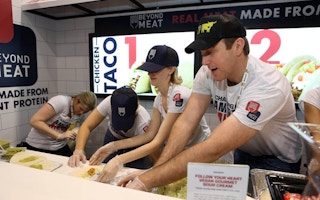Some people just love the taste and texture of meat. They love the smell of a good burger sizzling on the grill, or the crunch of a chicken strip. But what if meat alternatives became so high tech they tasted exactly the same?
Even further, what if they were higher in protein, had little environmental impact and were packed with vitamins and antioxidants?
Beyond Meat is a company that is claiming to produce high quality plant-based protein that tastes, and feels, just like the real thing.
The owner, Ethan Brown, has been dabbling in the meat alternative market for years. However, he doesn’t like to think of his product as an ‘alternative’. He calls it meat, because, as he puts it, what is meat but plants that have been turned into protein? And according to him, the idea that we need animals to assemble it is outdated.
How similar is Beyond Meat to the real deal? It fooled Mark Bittman, a food columnist at the NY Times. He writes: “When you take Brown’s product, cut it up and combine it with, say, chopped tomato and lettuce and mayonnaise with some seasoning in it, and wrap it in a burrito, you won’t know the difference between that and chicken. I didn’t, at least, and this is the kind of thing I do for a living.”
“
What is meat but plants that have been turned into protein?
Ethan Brown, owner of Beyond Meat
The burgers apparently deliver a similar feeling of satisfaction. Journalist Rowan Jacobsen speaks of slapping one of Brown’s burgers on the grill and, “It hit with a satisfying sizzle. Gobbets of lovely fat began to bubble out. A beefy smell filled the air. I browned a bun. Popped a pilsner. Mustard, ketchup, pickle, onions. I threw it all together with some chips on the side and took a bite. I chewed. I thought. I chewed some more. And then I began to get excited about the future.”
Beyond Meat has also gotten praise from Food Network star Alton Brown and Bill Gates.
One of their stated goals is the 25/20 campaign: to reduce meat consumption 25 per cent by 2020. It’s no secret that cattle farming and red meat production is especially hard on the environment. Where chicken and pork have significant environmental impact, cattle is downright awful.
Cattle take up 28 per cent times more land than chicken, 11 times the water, and it takes 36,000 calories of edible feed to produce 1,000 calories worth of beef.
So to help water shortages, food shortages and carbon emissions, it makes sense to change our way of eating. If animals no longer become necessary to consume (either for taste or nutrition), then why not?
However, not all are impressed with Beyond Meat’s texture. The Huffington Post reviewed the meat product and found, “Their appearance and texture come close to that of real chicken, but HuffPost editors detected something off — several, both vegetarian and otherwise, mentioned a sensation akin to the “uncanny valley” phenomenon most often used to describe robots that look too human, to the extent that they’re off-putting. In the same respect, the chicken strips seem to inhabit a strange territory between meat and vegetable, which editors across the board found unpleasant.”
For vegetarians and vegans who don’t like meat or the texture, this would not be the product to buy. However, for carnivores who would happily switch off meat if there was a decent substitute to buy that offered a similar amount of protein, products like Beyond Meat might provide an opportunity to improve both our carbon footprints and the quality of our food.










